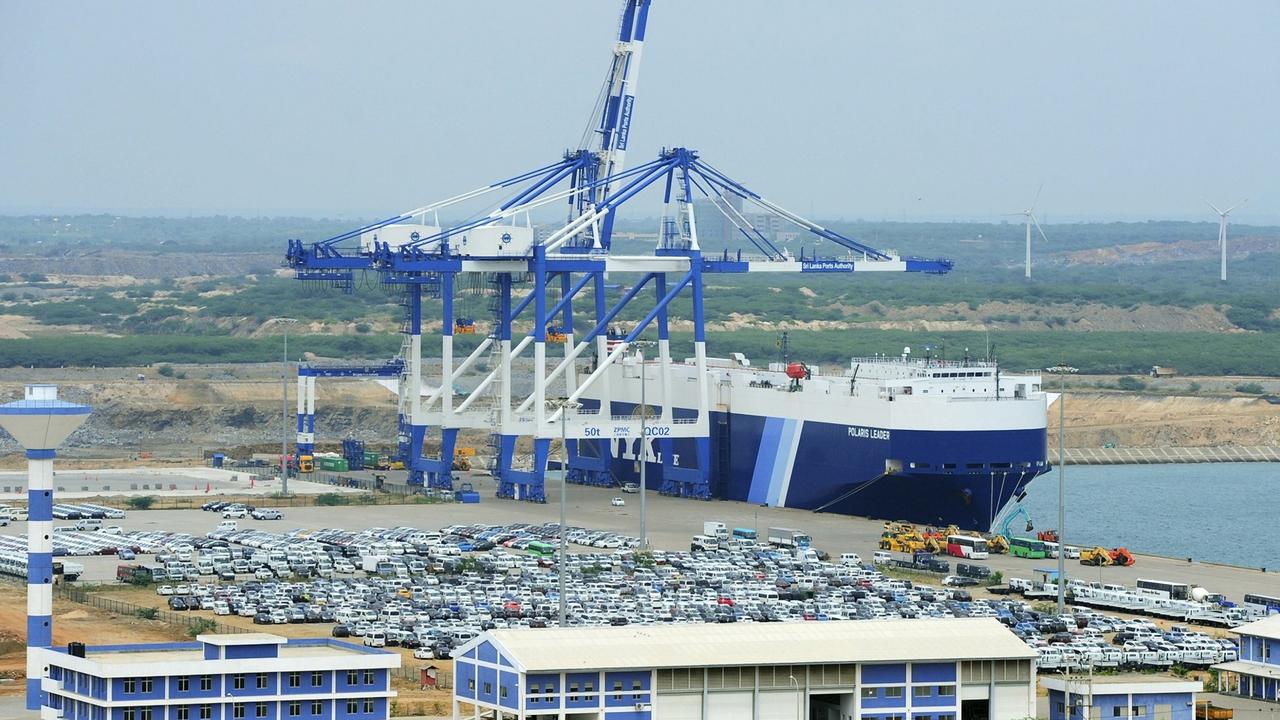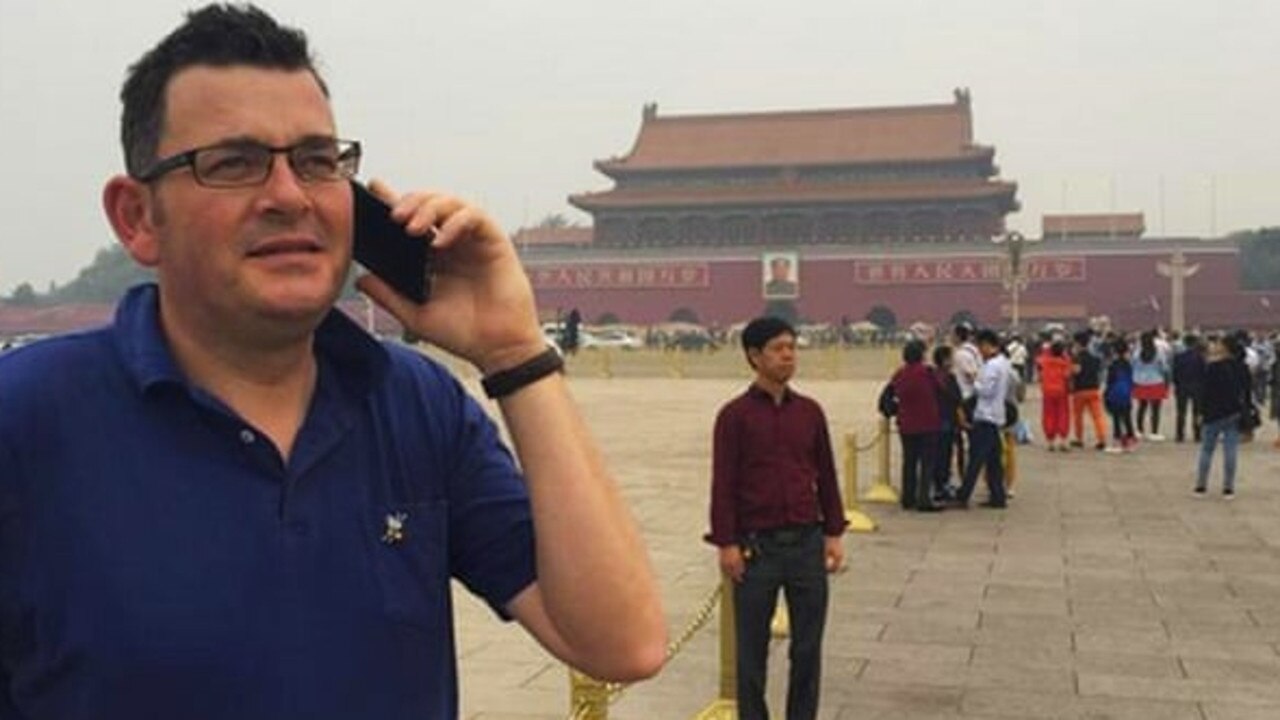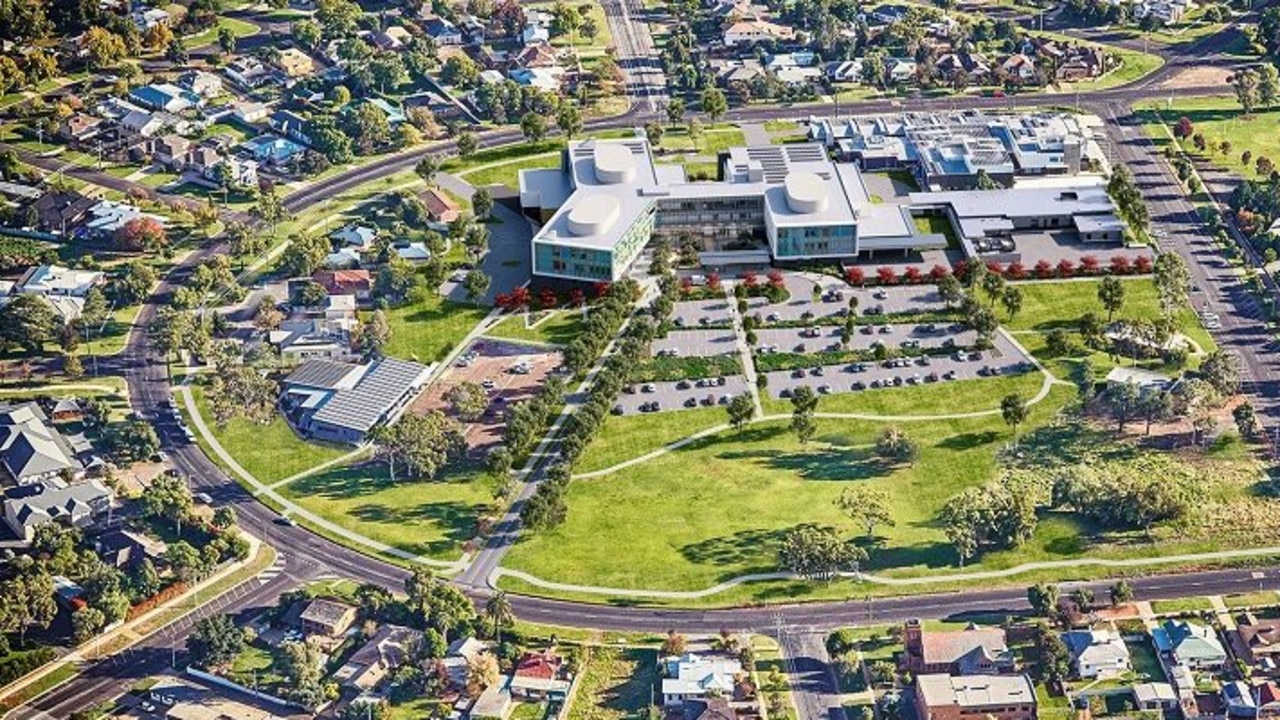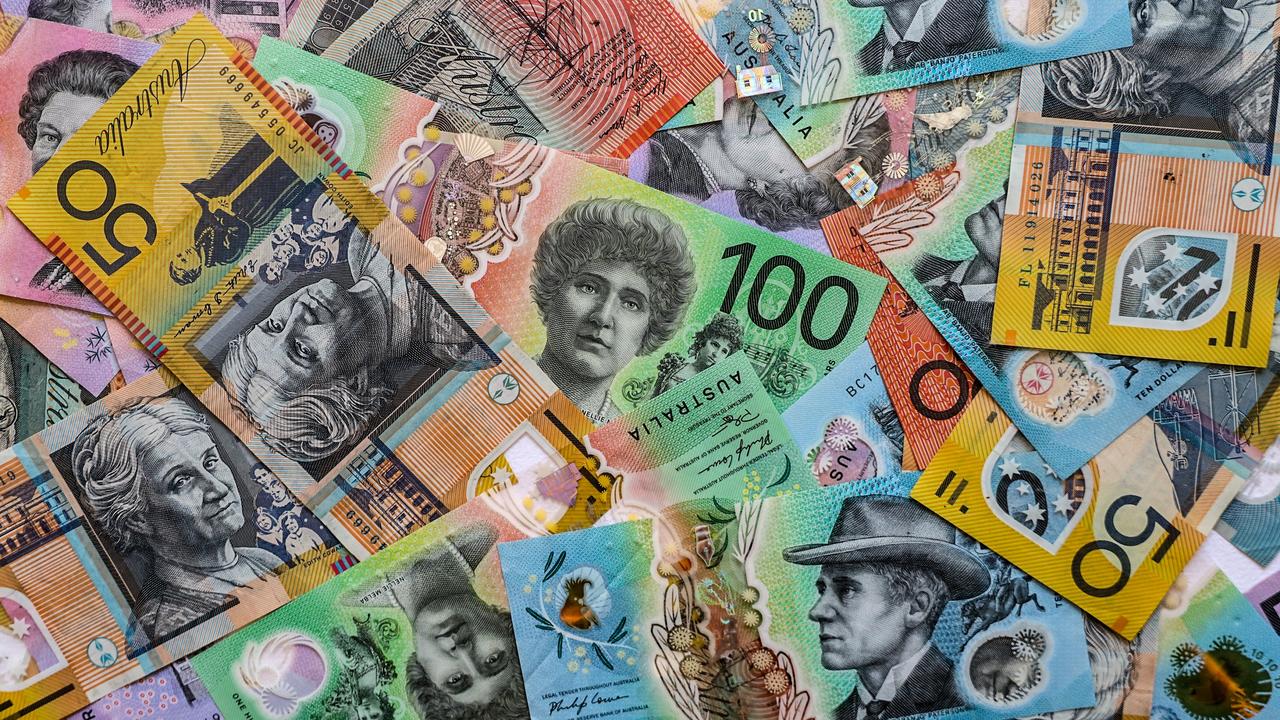Victoria’s Belt and Road deal with China raises concerns
Victoria’s controversial deal with China is raising concerns with critics saying Premier Daniel Andrews is a “bloody idiot” to sign up.

Victoria’s secretive agreement with China — part of its controversial Belt and Road Initiative — has come under scrutiny this week after the US threatened to “disconnect” from Australia if the deal threatened telecommunications.
Victoria’s partnership with China has always been controversial but it is now drawing more critics as concerns grow about China’s actions in the wake of the coronavirus pandemic.
China has hit out at Australia, placing a tariff of almost 80 per cent on its barley and blocking beef imports from four abattoirs, after Australia called for an independent inquiry into the origins of COVID-19.
The US has also raised concerns about the possible ramifications of working too closely with China.
On Sunday, US Secretary of State Mike Pompeo created headlines when he said the US wouldn’t hesitate to “disconnect” from Australia if Victoria’s involvement in China’s Belt and Road Initiative (BRI) threatened its telecommunications security.
While US Ambassador to Australia Arthur Culvahouse quickly issued a statement to “set the record straight”, noting that Mr Pompeo had not seen the agreement, China quickly seized on the comments and said Australia should be “well prepared to be abandoned at any time” by the US.
Victoria was expected to agree to a “co-operation road map” before June to further cement its relationship with China, after a memorandum of understanding was first signed in 2018.
However, Premier Daniel Andrews suggested this week the finalisation of the agreement could be pushed back.
“It’s fair to say people’s focus was on a global pandemic rather than necessarily some of those issues,” he told reporters on Wednesday.
“But when we’re in a position to make further announcements, we will.”
Victoria’s decision to pursue the deal flies in the face of the Australian Government’s stance not to sign up to the BRI.
One Nation leader Pauline Hanson is just one critic who believes Victoria should not be pursing the deal.
“People need to steer clear of China … Daniel Andrews I’ll tell you now you’re a bloody idiot if you head down this path,” she told Sky News.
Senator Hanson pointed to Beijing’s actions to seize a port in Sri Lanka after the country struggled to pay back a loan for the project.
“You have to look at what China has done to other countries,” Ms Hanson said.
“They want countries to be beholden to them.”
So what exactly has Victoria signed up to? Here’s what you need to know.
WHAT IS THE BELT AND ROAD INITIATIVE?
China’s Belt and Road Initiative is a huge trillion-dollar project that involves co-funding hundreds of infrastructure projects around the world, mostly built by China.
The ambitious project was expected to see China form partnerships with governments in 70 or more countries to build needed infrastructure, but also to help it to develop relationships, secure supplies of needed resources and widen its influence.
More recently there are claims the initiative is a “debt trap” and critics question what China really wants out of program.
The New York Times looked at the example of Sri Lanka’s Hambantota port.
China gave the government a loan to build the port despite feasibility studies showing it was not economically viable.
In order to obtain its loan, Sri Lanka was forced to accept Beijing’s preferred company as the port’s builder, according to a United States Embassy cable leaked to WikiLeaks.
After the port was built, it was not well used and the government could not keep up its loan repayments.
Rather than agreeing to write down the debt, China negotiated for the port and 15,000 acres of land around it to be leased to a Chinese company for 99 years in December 2017.
Although the lease doesn’t allow military activity at the port without Sri Lanka’s invitation, fears have been raised because the port is located just a few hundred miles off the shores of rival India and is also part of an important commercial and military waterway.
“The only way to justify the investment in Hambantota is from a national security standpoint — that they will bring the People’s Liberation Army in,” Shivshankar Menon, who was India’s foreign secretary and then its national security adviser when the Hambantota port was being built, told the New York Times.
RELATED: China’s warning to Australia after trade war threats with US
RELATED: US officials back Australia after growing tensions with China

WHAT HAS VICTORIA SIGNED UP TO?
It’s difficult to say exactly what involvement China will have in Victoria’s infrastructure as the only agreements so far are non-binding and talk more about general principles that guide their co-operation and don’t mention specific projects.
It’s also unclear what will be in the upcoming “road map” due to be signed this year.
News.com.au asked the Premier’s office whether the road map details would be made public before the agreement was signed, whether it would be binding, mention specific projects, involve using Chinese workers and whether it had already sought or would seek any Chinese loans in the future.
A government spokeswoman replied: “This agreement is about creating opportunities for Victorian businesses and local jobs – opportunities that will be more important than ever as we rebuild from the coronavirus pandemic”.
“We have no update on the road map at this time,” the spokeswoman said.
“The focus of the Government is on protecting the health of Victorians by slowing the spread of coronavirus, and getting thousands of people back to work – building the projects that matter to Victoria.”
Victoria first signed a “memorandum of understanding” (MOU) as part of the Belt and Road Initiative in October 2018. It is not legally binding and was an agreement between the Victorian Government and the National Development and Reform Commission (NDRC) of the People’s Republic of China.
The MOU aimed to find new ways to co-operate, with the aim of “promoting connectivity of policy, infrastructure, trade, finance and people”. This could be through connecting companies, exchange visits, pilot programs and possible joint projects.
It was followed up with a “framework agreement” on October 2019 to provide guidance on implementing the MOU, this included setting up a joint working group.
The framework, which was also non-legally binding, stated one of its objectives was “increasing the participation of Chinese infrastructure companies in Victoria’s infrastructure construction program”.
This includes encouraging Chinese firms to tender for significant projects in Victoria and promoting the state’s infrastructure projects through events and round tables.
The promotion of Victorian firms in China and third party markets was also agreed to.
Victoria said it would send regular delegations of infrastructure companies to China to better understand the opportunities and approaches in China. Its senior government officials would also share insights on things such as public private partnerships and road safety.
But the framework is not just about infrastructure, it also talks about exploring industrial co-operation in areas of “high-end manufacturing, biotechnology, agriculture technology etc”, sharing capabilities to cope with population ageing as well as enhancing two-way trade, especially for agricultural products, food, nutraceuticals and cosmetics.
‘VICTORIA’S EXPORTS TO CHINA HAVE DOUBLED’
In previous press releases, it was noted that Premier Daniel Andrews had travelled to China five times in five years, delivering on his promise to visit the country every year. He visited the country for a sixth time in October last year.
“Over the past four years, Victoria’s exports to China have doubled and Victoria’s share of Chinese investment in Australia has tripled – that means more jobs for Victorians,” Mr Andrews said in an April 2019 statement.
“I’m proud that Victoria is now seen as the gateway to Chinese investment and trade in Australia, and I look forward to deepening our longstanding ties.”
As of April last year, Victoria’s share of Chinese investment to Australia rose from 8 per cent to 25 per cent, and the government said its exports to China had grown from $6.5 billion to $10 billion in two years.
Victoria also exceeded its 10-year goal for the number of Chinese post-graduate students, and overnight spending from Chinese visitors rose to a record 659,000 visitors, worth $2.7 billion.
During his two China trips last year, the Premier met with key Chinese government officials and business leaders to discuss potential opportunities in delivering Victoria’s pipeline of infrastructure investment.
Providing opportunities for Chinese and Victorian businesses and officials to meet appears to be an important part of the initiative so far.

WEAKENING NATIONAL SECURITY
While Victoria has been spruiking the economic benefits of its involvement with China, others say its choice to sign up to the BRI flies in the face of the Australian Government’s decision not to be involved.
When asked about the Victorian decision, Prime Minister Scott Morrison told reporters on Sunday that “we didn’t support that decision at the time they (Victoria) made it”.
Opposition leader Anthony Albanese has also confirmed for the first time that a future Labor government under his leadership would not support China’s initiative.
“A government I lead would not be signing up to the Belt and Road Initiative,” Mr Albanese told Triple M Tasmania this week.
Australian Strategic Policy Institute senior fellow Dr Anthony Bergin told news.com.au that China’s tactic of signing an agreement with the Victorian Government was an attempt to “weaponise federalism”.
He said a similar approach had been taken in the Solomon Islands, where China had tried to broker a deal with a provincial government to lease a whole island.
“The principle is the same: to get around national governments, they try to sweet talk and offer inducements at a lower level of government, and I think that’s what the Chinese are trying to do in Victoria,” Dr Bergin said.
“We don’t need for state government to be embarking on divergent paths from national government when it comes to dealing with China.”
He said the federal government should not be undermined by state governments who did not have the same level of strategic intelligence as federal authorities.
“We’re trying to manage relations with China at a very difficult time, we don’t want any sharp differences between federal and state government when we are trying to get a cohesive approach when it comes to infrastructure development.”
This week The Age revealed Victoria did not consult the Department of Foreign Affairs and Trade before signing the framework agreement last year, fuelling concerns among senior officials that it could undermine Australia’s push to counter Beijing’s growing influence in the region.
Premier Daniel Andrews defended the move on Wednesday and said Victoria had a close relationship with the department.
“The first agreement was sent to DFAT in draft form and the second agreement is simply an extension of the first,” he said.
“We have a strong and good relationship with China and what that means is our exports are up 62 per cent in the last five years.
“I’m not quite sure what people are suggesting — rather than having a good relationship with China we have a bad one, or we send less product to China rather than more?
“If that’s the approach people want to take, then that will cost jobs.”
THE AGREEMENT IS ‘VAGUE’
Dr Bergin acknowledges there is no “smoking gun” on any particular project attached to Victoria’s agreement but there doesn’t seem to have been any specific projects developed under it yet.
“The agreement is vague,” Dr Bergin said. “It doesn’t list any particular projects.”
He said it was also not clear who would build the infrastructure in Victoria and whether this would involve Chinese state-backed companies using Chinese workers.
However, Professor James Laurenceson, director of the Australia-China Relations Institute at the University of Technology, Sydney, does not share Dr Bergin’s concerns about Victoria’s agreement and says “debt trap diplomacy” claims have been debunked.
He told news.com.au the only thing that China had gained from leasing the Sri Lankan port was an “asset bleeding cash”, noting naval assets were not allowed to dock in the port.
Prof Laurenceson said Victoria probably didn’t need China to fund its infrastructure and his guess was the memorandum of understanding was being used as a way of having conversations with China about matters that concerned Victoria, whether that’s farmers, tourism, education sector or hi-tech manufacturing.
“It’s really an invitation to have a conversation with China about anything you want,” he said.
“There’s not a single example of how (Victoria) signing a non-binding MOU is a security risk.”
Prof Laurenceson said any foreign investment worth over a certain amount also had to be reviewed by the Foreign Investment Review Board.
“They have the opportunity to approve it or knock it back,” he said.
“The only risk I see, which I hesitate to call a risk, is of supporting Chinese government propaganda – OK just say that – but let’s not pretend there’s any genuine national security risk.”
He believes the only reason China sought an agreement with Victoria was because Chinese diplomats were under pressure to push the BRI after Canberra knocked it back.
“I am comfortable with Australia’s approach in not signing up, my problem is with the hyperventilation with Victoria for doing so,” he said.
“I think it’s largely a non-issue as the Australian government retains all the tools to protect its interests. Let’s not panic.”
However, ASPI’s Dr Bergin said he didn’t understand why Victoria would want to continue with the agreement.
“Why would we need to borrow money from the Chinese? If it’s about cheap financing, surely there’s plenty of cheap money around at the moment. I think the timing of this is quite strange in some ways,” he said.
“Why would we right now, when China is threatening Australia with trade restrictions, why is this a good time to be entering closer relations with them?”




